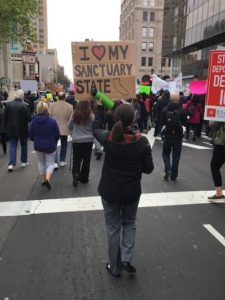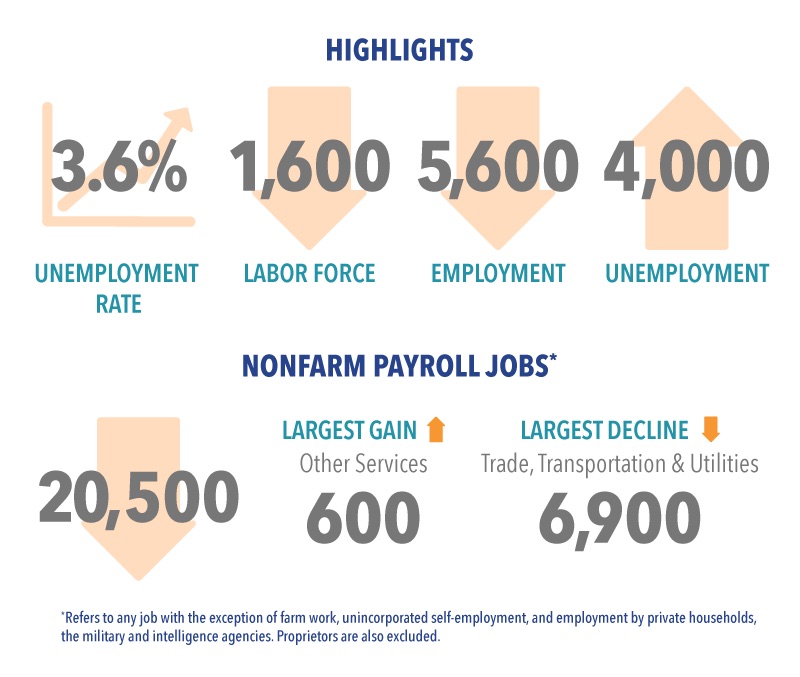Daily Business Report-March 8, 2018
Gov. Jerry Brown and California Attorney General Xavier Becerra address reporters about the federal lawsuit against the state. (Photo by Laurel Rosenhall for CALmatters)
Gov. Brown: Trump Administration Lawsuit
Against California ‘Is War’ and ‘Will Not Stand’
By Judy Lin | CALmatters
A day after the Trump administration sued California over its new “sanctuary” laws, state officials pushed back hard, with Gov. Jerry Brown calling the move tantamount to “war.”
U.S. Attorney General Jeff Sessions announced the lawsuit, which he filed late Tuesday, at a police event near the Capitol on Wednesday. He said California leaders were scoring political points on the backs of law enforcement with immigration policies that hinder federal agents’ ability to enforce U.S. law. “We’re simply asking the state and other sanctuary jurisdictions to stop actively obstructing federal law enforcement,” Sessions said as hundreds of protesters shouted outside. “Stop treating immigration agents differently from everybody else for the purpose of eviscerating border and immigration laws, and advancing an open-borders philosophy shared by only a few, the most radical extremists.”

The attorney general accused local and state elected officials, including Oakland Mayor Libby Schaaf and state Attorney General Xavier Beccera, of promoting an extreme agenda to frustrate federal agents. Becerra, a Brown appointee, is running for election this year, as is Schaaf. At a joint press conference with Becerra after Sessions’ announcement, Brown said he does not believe in “open borders.” The laws being challenged in the suit were carefully crafted, he said, to balance the state’s right to manage public safety with federal authority to oversee immigration. He termed Sessions’ appearance a stunt.
“This is completely unprecedented, for the chief of law enforcement in the United States to come out here and engage in a political stunt, make wild accusations, many of which are based on outright lies,” Brown said —unusually strong language for a governor who has largely been cautious in his criticism of the Trump administration. “This is basically going to war against the state of California, the engine of the American economy. It’s not wise, it’s not right and it will not stand,” Brown said.
Sessions’ visit is the latest political salvo between the Trump administration and California, whose Legislature has favored immigrant-friendly policies. Candidates for statewide office have been jockeying to position themselves as most representative of the “resistance state.” Becerra has sued the administration more than two dozen times on a range off issues, including the president’s travel ban and ending the Deferred Action for Childhood Arrivals (DACA) program, which allowed those brought to the country illegally as minors to remain here on a temporary basis.
In his 20-minute speech, Sessions said Schaaf, who recently tipped off the public about an imminent immigration raid, “has been actively seeking to help illegal aliens avoid apprehension by ICE (Immigration and Customs Enforcement).” That has made the job of immigration agents more dangerous, he said as the outside protesters outside chanted, “Immigrants stay, Sessions go!”
“How dare you needlessly endanger the lives of our law enforcement officers to promote a radical open-border agenda,” said Sessions, who noted that the United States annually admits 1.1 million immigrants lawfully as permanent residents. Within hours, Schaaf posted on Twitter that Oakland’s violent crime rates have declined in the past five years, answering Sessions’ claim that crime generally is on the rise. The U.S. Department of Justice lawsuit asks a federal court to strike down three state laws that, among other restrictions, require employers to keep information about their employees private without a court order, mandate inspections of immigration detention facilities, and bar local law enforcers from questioning people about their immigration status during routine interactions. The most contentious one does allow state officials to cooperate with federal agents when deportation is required for those who have committed any of 800 serious crimes.
Washington will have to show that the state’s new laws infringe on its ability to enforce immigration rules, which may be hard to do, said Kevin R. Johnson, dean of the law school at the University of California, Davis. “Ultimately, I think the state is likely to win most, if not all, of the lawsuit,” Johnson said. Sessions said the sanctuary laws were designed to frustrate federal authorities. “Just imagine if a state passed a law forbidding employers from cooperating with OSHA in ensuring workplace safety, or the Environmental Protection Agency for looking out for polluters. Would you pass a law to do that?”
Sessions singled out Beccera, California’s top prosecutor, for threatening to subject business owners with fines up to $10,000 if they cooperate with ICE agents. Beccera, who delivered a private address to the police group Wednesday, said at the press conference that “California has exercised its rights to define the circumstance where state and local law enforcement may participate in immigration enforcement. “California is in the business of public safety. We’re not in the business of deportations,” he added, repeating statements he made Tuesday evening in the wake of the federal government’s filing. “I look forward to making these arguments in court.”
Lt. Gov. Gavin Newsom, a Democrat who is running for governor, had praised Schaaf for her warning, a move Sessions said was “an embarrassment to the proud state of California.” Newsom planned to respond on Facebook.
Some other candidates for statewide office were quick to offer their views on the lawsuit. State Senate leader Kevin De León, who is challenging Dianne Feinstein for her U.S. Senate seat and wrote one of the laws at issue, told reporters the suit is retribution against a state that resoundingly rejected Trump on election day. “From Day 1, California has been in the crosshairs of this president,” he said. “We are on solid constitutional legal ground, so we welcome this lawsuit.”
Labor unions and immigration-rights organizations, meanwhile, decried Sessions’ announcement. The Coalition for Humane Immigrant Rights said Washington was sowing “deception and fear mongering” to push an anti-immigrant agenda.
CALmatters reporters Laurel Rosenhall and Elizabeth Aguilera contributed to this report. CALmatters is a nonpartisan, nonprofit media venture explaining California policies and politics.
___________
Morning Report:
Airport Authority on the Chopping Block
By Andrew Keatts | Voice of San Diego
Assemblywoman Lorena Gonzalez Fletcher has made a habit of proposing bills in Sacramento that would make big changes in San Diego.
She’s at it again, sponsoring a bill to fold the regional Airport Authority into the Port of San Diego.
The airport actually used to be under the port’s umbrella. That changed in 2003, with state legislation creating a new agency dedicated only to the airport. Gonzalez Fletcher’s bill would essentially reset the situation.
The airport has a roughly $250 million annual budget, which would head back to port control — though that would still be subject to Federal Aviation Authority rules stipulating the money be spent on airport-related expenditures.
Gonzalez Fletcher said it’s simple: the airport is a regional asset dealing with regional issues that are better addressed by a regional agency with a broad mandate.
It’s the third time she’s proposed big changes at the state level to a local agency. In 2015, Gov. Jerry Brown vetoed her bill to revamp Civic San Diego. Last year he signed her bill to reform SANDAG, while the agency was overcome by scandal.
“This is different than SANDAG,” Gonzalez Fletcher said. “I don’t detest the Airport Authority. This is about what’s best for regional planning.”
The airport’s chair, meanwhile, thinks it’s all misguided, and that the airport is already thinking regionally.
___________

San Diego Unemployment Increases
to 3.6 Percent in January; Down 20,500 Jobs
San Diego Workforce Partnership
“The beginning of the year finds many workers looking for a fresh start. We see declines in industry employment when those workers leave their jobs in search of the next big thing. Employers should be on the lookout for eager talent.” — Phil Blair, Executive Officer, Manpower/Staffing San Diego
_________________
Greater San Diego Association of Realtors:
Rising Home Prices Overshadow Sluggish Sales
Prices of resale homes in San Diego County continue to hike upward, while the actual number of sales labors under a lack of inventory, according to housing statistics compiled through the Multiple Listing Service by the Greater San Diego Association of Realtors.
In February, the median price of single-family resale properties rose 3 percent over the previous month, to $614,000. Condos and townhomes, meanwhile, jumped 5 percent in price, to $426,000 – the highest median price for attached properties ever recorded in the Multiple Listing Service. Year over year, the median price of all resale homes in San Diego County is up nearly 10 percent.
The number single-family home sales in February were virtually the same as in January, despite the fact that February had fewer days. Condominiums and townhomes (attached properties) dipped by 3 percent from January to February.
“Prevailing mortgage rates are starting to rise, which will have an impact on home-buying decisions,” said SDAR President Steve Fraioli. “I’m hoping that optimism about the economy will contribute to shaking loose the market’s supply of homes this spring.”
In February, the ZIP codes in San Diego County with the most single-family home sales were:
92024 (Encinitas) with 31
92114 (Encanto) with 31
92019 (El Cajon) with 31
92084 (Vista East) with 30
91977 (Spring Valley) with 29
92026 (Escondido North) with 29
92056 (Oceanside East) with 29
A $21.5 million mansion on the Del Mar coast that closed in February is the most expensive home sold in the past 10 years — and one of the most expensive ever sold — in San Diego County. The oceanfront property is 6,200 square feet, with 5 bedrooms and 9 baths, on 1.11 acres.
SDAR’s housing statistics are compiled monthly from the Multiple Listing Service.
_________________

Janice Freeman: Going the Distance
Janice Freeman has a voice to remember. The soulfulness and round sounds of her vocal range are beyond imaginary overtones ever heard before.
Singing is her deepest passion and when you’re passionate about something you’re willing to give it your all and go the distance despite the many challenges that are faced along the way.
In 2012 Janice was diagnosed with cervical cancer. With her surviving spirit and supportive family she fought it and survived. In the midst of all the trials and tragedy she held on, not letting go of her musical dream and continued to press with perseverance. She auditioned for “The Voice” competition made it to the top 11, becoming a nationally acclaimed artist.
Freeman will speak at the Leadership Conference March 23 as part of San Diego Women’s Week sponsored by the North San Diego Business Chamber. Women’s Week runs March 19-21-23. Click here for the schedule.
_________________
Barnes & Thornburg Launches San Diego
Office with Attorney Troy Zander in Charge

Barnes & Thornburg LLP has announced the opening of an office in San Diego headed by attorney Troy Zander, who will serve as partner-in-charge. This is the firm’s second location in California, following the launch of the Los Angeles office in 2011, and will be temporarily located at 501 W. Broadway, Suite 800, in Downtown.
Zander is a lender-side financing attorney with a focus on life sciences and technology, and also advises clients on traditional commercial leveraged debt financings, venture debt financings and bridge loans. He has represented agents, lenders and participants in credit facilities totaling over $50 billon. He also devotes a large portion of his practice to debt restructuring, and has managed over $2.5 billion in federal, state and out-of-court proceedings. Zander also represents lenders in forbearances, loan restructurings, amendments and modifications.
Zander earned his J.D. from the University of California San Diego School of Law and his B.A. from the University of California San Diego. He is a member of the California Bar Association, San Diego County Bar Association and the Federal Bar Association. Zander is active in the San Diego community, having served on boards for Feeding America-San Diego, The New Children’s Museum and the San Diego Regional Economic Development Corporation.
Commentary
California Chaos: Unchallented Liberalism Leaves
Homelessness, Drug Abuse, Garbage in its Wake
Liberal policy failure is all around us and destroys lives every day. In California, the destruction of society and individual lives has become so overwhelming, the state’s liberal overseers now spend their time covering up where they can and normalizing the chaos as much as possible.




